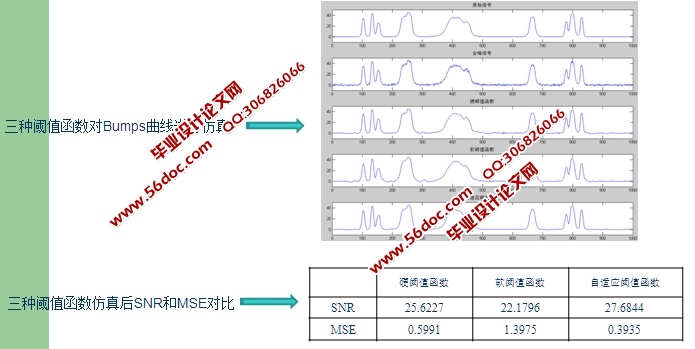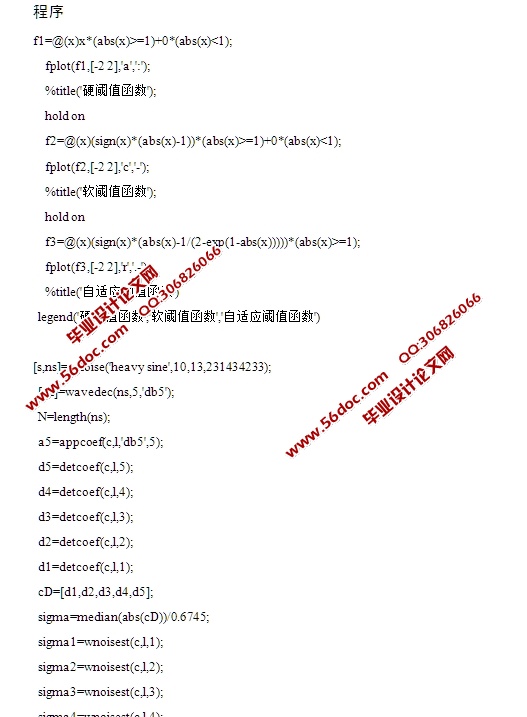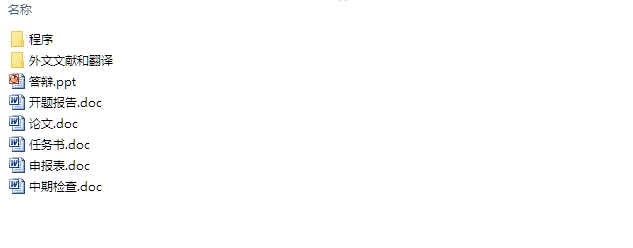基于MATLAB的小波收缩去噪方法研究(程序)
无需注册登录,支付后按照提示操作即可获取该资料.
基于MATLAB的小波收缩去噪方法研究(程序)(课题申报表,任务书,开题报告,中期检查表,外文翻译,论文15400字,程序,答辩PPT)
摘 要
信号在采集、传输和获取的过程中难免会受到各种噪声的干扰,这些噪声也极大地影响着人们从信号中获取有用的信息,因此对信号去噪的研究显得十分重要。小波去噪是近年来信号与信息处理领域的热门技术,利用小波算法对信号进行去噪已经受到许多专家学者的重视,并取得了非常好的效果。
本文综述信号去噪的研究现状,通过对信号去噪方法的研究,从理论上分析了小波变换作为新型信号处理工具的优越性;然后重点研究小波收缩去噪算法,在分析了传统小波阈值收缩去噪算法的优缺点之后,引入一种自适应小波阈值函数和自适应阈值算法;在MATLAB软件环境下,通过对其工具箱中特有的Heavy sine曲线和Bumps曲线进行小波收缩去噪仿真试验,以此来验证小波收缩算法的有效性。实验结果表明,本文提出的小波阈值收缩去噪算法对比传统小波阈值收缩算法去噪效果更好。
关键词: 噪声干扰;小波收缩;自适应阈值;MATLAB
Abstract
Signal will inevitably suffer the interference of various noises during the process of collection, transmission and acquisition, those noises is also greatly influences people to obtain useful information from the signal, therefore, the study of signal denoising is very important. Recently wavelet denoising is the popular technology in the field of signal and information processing, resulting in an increasing numbers of experts and scholars has paid attention to using wavelet algorithm in signal denoising and achieved the excellent effect.
This paper reviews the research status of signal de-noising, through the study of signal de-noising methods, theoretical analysis of wavelet transform as a new signal processing tools superiority. Then focus on the wavelet shrinkage denoising, after analyzing the advantages and disadvantages of the traditional wavelet threshold shrinkage denoising,introducing an adaptive wavelet threshold function and adaptive threshold algorithm. In the MATLAB software environment, by performing Heavy sine curve and Bumps curve its unique toolbox wavelet shrinkage denoising simulation then verified the effectiveness of wavelet shrinkage algorithm. The results show, The proposed wavelet threshold shrinkage denoising algorithm better than traditional wavelet threshold shrinkage algorithms.
Key words: Noise interference; Wavelet shrinkage; Adaptive threshold; MATLAB
本文主要研究内容
本文主要研究基于小波变换下的小波阈值收缩去噪算法,根据传统软硬阈值收缩去噪算法的优缺点引用一种自适应阈值收缩算法,在MATLAB软件环境下,通过对其工具箱中特有的含有高斯白噪声的仿真信号进行降噪处理,以此来验证小波收缩算法比较于傅里叶变换和传统小波软硬阈值算法的优越性的思路来撰写论文。
第一章主要是对本课题的背景和课题的意义进行阐述,并对信号去噪的方法进行研究。
第二章主要介绍了小波变换的基本理论,包括其发展历程和研究现状,并对其理论知识和特点等进行详细的研究。
第三章对基于小波变换的小波阈值收缩算法作为重点进行研究,并根据传统软硬阈值收缩法的优缺点引入一种自适应小波收缩算法,从理论上证明该算法的优越性。
第四章首先对MATLAB仿真软件进行概述,在MATLAB环境下研究了小波收缩算法相关参数的选择,并对其工具箱中的加噪仿真信号分别进行去噪试验,得到仿真结果。



目 录
第1章 概 述 1
1.1研究课题的目的及意义 1
1.2信号去噪的研究现状 1
1.3本文主要研究内容 3
第2章 小波变换基本理论 4
2.1小波变换简介 4
2.2小波变换发展概述和发展现状 5
2.3 连续小波变换 6
2.4 离散小波变换 8
2.5 小波变换优势 9
2.6 本章小结 10
第3章 小波收缩法研究 11
3.1 小波去噪方法 11
3.2 小波收缩算法 12
3.3 小波收缩法小波基的选择 13
3.4 小波收缩法阈值函数的选择 14
3.5 小波收缩法阈值选择 17
3.6 本章小结 19
第4章 基于MATLAB的小波收缩法信号仿真 20
4.1 MATLAB介绍 20
4.2 白噪声特性与信号去噪性能评价标准 22
4.3 对Heavy sine曲线进行仿真 24
4.4 对Bumps曲线进行仿真 25
4.5 本章小结 27
结 论 28
参考文献 29
致 谢 31
